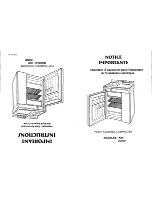
MN-36246 • Rev 3 • 03/17 • 1000-MR2 Refrigerated Carts 15
Operation
Product Covering
To maintain sanitation control when loading the
refrigerated cart, foods must be above 140°F (60°C) and
should be tightly covered. A tight cover is an important
part of proper chilling methods and must be used to
prevent the possibility of accidental contamination by
airborne bacteria.
Stainless steel pan covers may be used. Stainless steel
covered pans must include a label indicating pan
contents and use-by date. A cover of clear plastic wrap
is also acceptable.
When using plastic wrap as a food covering, make
certain the wrap comes in direct contact with the
surface of the product and extends around and down
each side of the pan. This is an important step to ensure
proper chilling times. Spacing left between the plastic
wrap and the surface of the food creates an insulating
air gap resulting in more product heat retention and a
slower chilling rate.
Meat roasts and other larger, dense products should be
no larger than a weight of 8 to 10 pounds (4 to 5 kg) per
item. Because of the density of these products, chilling
could take up to 4 hours. Due to longer chilling time
required, it is also suggested these items be chilled at
the end of the day with the chiller set in the automatic
chill/hold mode. This method provides the operator
with fully chilled product holding at a refrigerated
temperature on the following day.
Prior to chilling, roasts must be wrapped in clear plastic
and placed in the chiller. Do not slice roasted meats
until the day of service.
Portioned meat products such as pork chops or meat
patties should be chilled directly on the sheet pans
on which they were cooked. Cover the sheet pans
with clear plastic wrap for chilling. After chilling, this
type of product can be placed in steam table pans for
refrigerated storage.
Portioning and Packaging
1. During portioning and packaging operations, all
foods should be maintained at or above 140°F (60°C),
or below 40°F (4°C).
2. If cooked foods exceed the processing capacity
of the refrigerated cart, place hot product in an
appropriate back-up hot holding device. Hold hot
foods at a temperature above 140°F (60°C).
If a hot food holding cabinet is not available, place
hot foods in short-term refrigerated storage until
these products can be loaded into the refrigerated
cart for the next available processing cycle.
Production of cooked foods should not exceed the
processing capabilities of the chiller, therefore,
do not adopt short-term refrigeration as a routine
practice but use only in an emergency situation.
3. Fill containers to a 12 pound (5 kg) limit or
maximum depth of 2" (51 mm) of product. Do not
use plastic or Lexan
®
containers.
4. For faster cooling, place lids and over-wrap
materials directly on the surface of foods. As
previously indicated, air trapped between the lid and
food surface acts as an insulator and will increase
chill time.
5. For faster chilling times, place low profile foods such
as chicken quarters, fish fillets, or ribs in low depth
containers such as 1-1/2" (38mm) deep sheet pans.
6. Large cuts of meat and poultry that weigh a
maximum of 8 to 10 pounds (4 to 5 kg) should be
individually wrapped with tight fitting film and
placed on sheet pans in the chill cabinet.














































